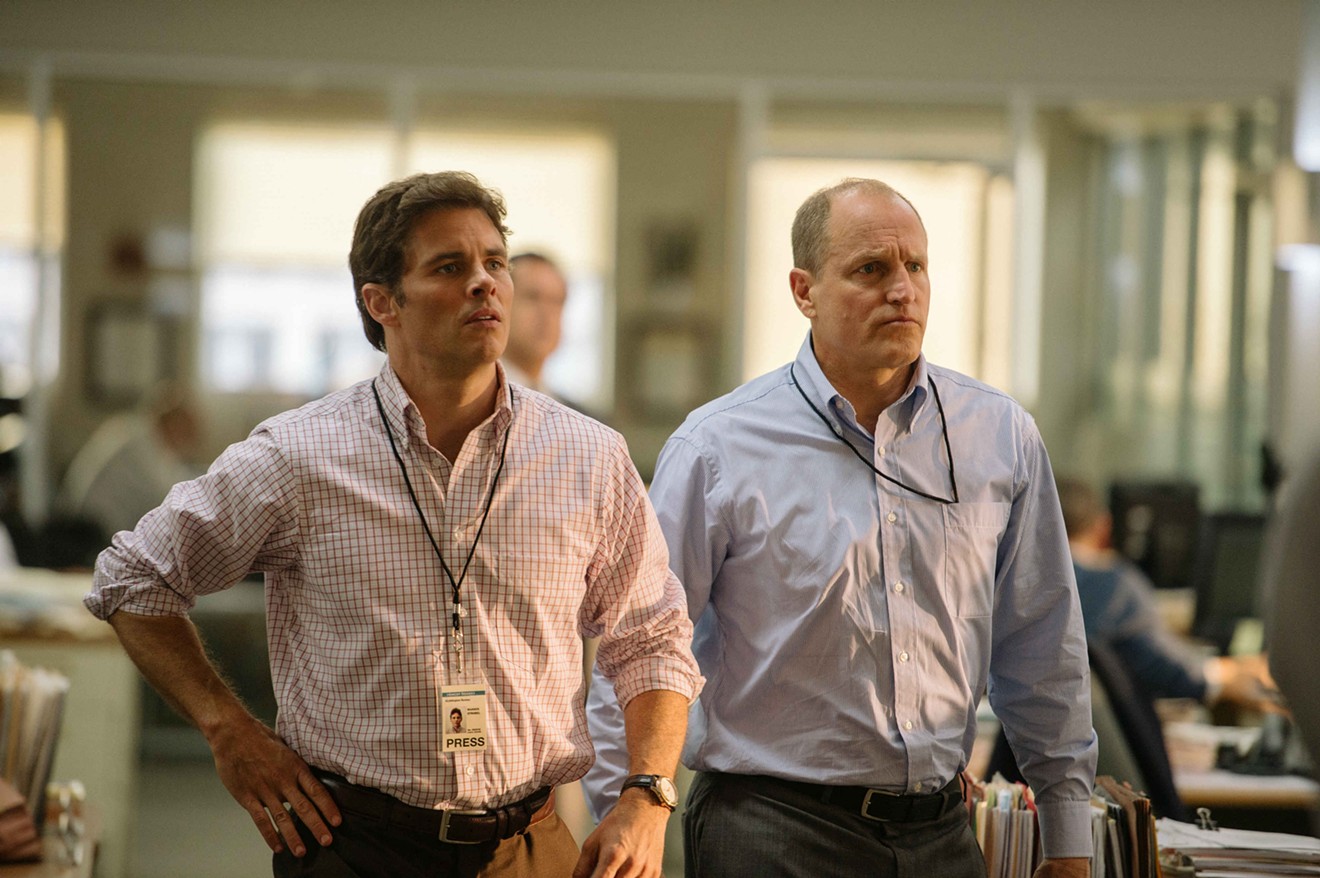Pop quiz, hotshot. Let’s say you’re making a movie for American audiences about crusading reporters exposing the lies and stupidity that led this nation to chuck a trillion dollars and thousands of lives into George W. Bush’s war in Iraq. And let’s say that, as you tell the story of Knight Ridder’s Jonathan Landay and Warren Strobel finding and printing the truth but being roundly ignored, you’re aiming not just at American audiences but multiplex audiences. And let’s say you’re enough of a conscientious liberal and truth-teller that, over producers’ certain objections, you’re committed to including a brick-thick monologue laying out a millennium’s worth of sectarian violence in the region, complete with a breakdown on the differences between Sunni and Shi’a from World Religions 101. And let’s say you’re also worried this is the moment viewers will duck out to pee.
Where in the script would you stick that speech? To what character would you assign it?
Oh, I forgot to mention that in this hypothetical you’re Rob Reiner, the born showman who gave us Spinal Tap, The Princess Bride, Misery, A Few Good Men and When Harry Met Sally. And being Rob Reiner, you know precisely how to make that info-dump play. Put it in the mouth of a charmingly nervous single, played by Jessica Biel, out on her first date with the hunky reporter she’s trying to impress. Yes, Reiner has the chutzpah, the crowd-pleaser’s shamelessness, to make that soliloquy a flirtatious goof, words that gush like Champagne uncorked. Biel’s character reels through it in a quiet restaurant, growing more — and more — turned on with each proper noun, a blazing rom-com performance in a movie with its mission to lay bare a historical crime. Her paramour, James Marsden’s Warren Strobel, who always looks at every moment like Superman in his Daily Planet disguise, gapes at her, stunned and aroused.
That scene in Shock and Awe is ridiculous. It’s also delightful, a flight of fancy that, somewhat perversely, at last got me into this often messy drama’s singular groove. I’ll spend the rest of my life wondering just how Reiner found the fortitude not to cut to an older woman declaring, “I’ll have what she’s having.”
Unlike All the President’s Men or even The Post, Reiner’s film isn’t about verisimilitude, about capturing in a docu-fiction some convincing sense of brave journalists’ legwork and tough choices and hideous ties. Julia Roberts’ I Love Trouble is more convincing a portrait of shoe-leather journalism. Instead, Reiner is after something less noble and artistically satisfying but still potent — sometimes even thrilling. Shock and Awe is a 90-minute liberal told-you-so, a polemic that, like a long Rachel Maddow segment, is more cheery than thunderous, even as it names the names that must be named. Reiner and his screenwriter, Joey Hartstone, produce their receipts.
Reiner roll-calls through the senators who voted to approve Bush’s invasion: Joe Biden, Hillary Clinton, John Kerry, Joseph Lieberman, John McCain. We get a scathing speech about the corruption of Colin Powell, the Bush team’s “closer.” We glimpse what passed for debate about the war on TV back then, in the days before the rise of Jon Stewart or MSNBC had an identity: Sean Hannity rattling off administration talking points about the threat posed by Saddam Hussein to a sputtering, ineffectual Jerry Springer. As Landay, Woody Harrelson calls war cheerleader William Kristol a “butthole,” a term that, perhaps because its literal meaning has not been diminished through overuse, actually seems somehow filthier than asshole.
Shock and Awe doesn’t just mention Judith Miller’s craven, credulous New York Times reporting in passing as our heroes chase down their leads. Instead, in gratifyingly snarky scenes, it lays bare the Bush administration's abuse of access journalists, pinning down how lies and cherry-picked intelligence about Hussein’s phantom weapons of mass destruction got leaked by Bush’s war cabal officials to the likes of Miller, whose uncritical reporting of those lies then got cited by those same officials as proof of their case. Reiner contrasts Miller’s too-trusting headlines with Knight Ridder’s skeptical ones, emphasizing the distinction between the competing journalists’ sources. Rather than top dogs with an agenda, Landay and Strobel mostly relied on career diplomats and civil servants, the people trying to stop a potential disaster rather than sell a crisis. Talking to actual experts rather than to politicians eager to justify an invasion, Knight Ridder’s team got the truth most establishment press outlets missed: There were no WMDs, and deposing Hussein would set off decades of civil war.
Shock and Awe is jittery at first, uneven in its rhythms, overawed by its history, corny as Iowa in July. The opening should stir tears, but it’s a howler. After the requisite muted trumpet and shots of the Capitol, we watch a vet who has lost his legs in Bush’s war arrive to testify before a congressional committee in 2006. You can picture, already, the usual Radiant Light of American Decency bathing the room’s burnished wood. Right on cue, just seconds into his remarks, the soldier folds up his speech and elects to speak from the heart. The address that follows, though, is hilariously canned, so screenwriter-sculpted that, after reeling off many facts and figures, the soldier declares, “The only problem with numbers is they can be impersonal” — as one does when speaking extemporaneously.
But the second half, which finds Landay and Strobel interrogating sources, often in brisk montage, is score-settling bliss. (They’re joined in their quest by Reiner himself, playing Knight Ridder’s Washington bureau chief John Walcott, and a dutifully salty Tommy Lee Jones as Joe Galloway.) At his best, throughout his career, director Reiner has been an avuncular tweaker of genre, honoring Hollywood formula while injecting into it his humane sense of satire and his unshakeable hammy sweetness. Here, he revels in depicting truth-tellers on the case, his skill with — or weakness for — stereotype well-suited for quick encounters and scenes of chatty pros bonding.
One highlight finds the reporters snarking in disgust at a Dick Cheney appearance on Meet the Press, riffing along like the Mystery Science Theater crew or me at home on my couch on whatever Sunday that was in 2003. Reiner’s film — so ingratiating, blunt, set-bound, over-lit and baldly expository — never suggests life in an actual newsroom. But it nails what life was like for those of us who understood, 15 years back, that we were being sold a disaster — and witnessing the fourth estate’s abdication of its responsibility. Every time I hear that weary canard that the “media” is somehow “liberal,” I ask this simple question: Then how come only Knight Ridder and the alternative press reported the truth in the run-up to Iraq? Reiner’s film is too Reiner to pass for history, but it’s awfully gratifying.
[
{
"name": "Air - MediumRectangle - Inline Content - Mobile Display Size",
"component": "18855504",
"insertPoint": "2",
"requiredCountToDisplay": "2"
},{
"name": "Editor Picks",
"component": "17105533",
"insertPoint": "4",
"requiredCountToDisplay": "1"
},{
"name": "Inline Links",
"component": "18349797",
"insertPoint": "8th",
"startingPoint": 8,
"requiredCountToDisplay": "7",
"maxInsertions": 25
},{
"name": "Air - MediumRectangle - Combo - Inline Content",
"component": "17105532",
"insertPoint": "8th",
"startingPoint": 8,
"requiredCountToDisplay": "7",
"maxInsertions": 25
},{
"name": "Inline Links",
"component": "18349797",
"insertPoint": "8th",
"startingPoint": 12,
"requiredCountToDisplay": "11",
"maxInsertions": 25
},{
"name": "Air - Leaderboard Tower - Combo - Inline Content",
"component": "17105535",
"insertPoint": "8th",
"startingPoint": 12,
"requiredCountToDisplay": "11",
"maxInsertions": 25
}
]












